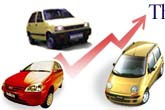

|
|
|
|
| HOME | BUSINESS | REPORT | |||
| August 9, 1999 |
 
Veeresh Malik in New Delhi Sales of new cars in July are usually low in India. But this year has been different. Monsoons tend to slow down car purchases. Sales usually start picking up by the second half of August, peak around the Dasara/Bijoya festival season and stay steady through the winter. But this July has been different. Almost every automobile company has issued media statements that sales in July have risen, and even touched record levels. Maruti Udyog Limited, the auto giant with an 80 per cent market-share, led the pack, as its sales in July touched an all-time high. Why are more and more people buying cars? Have not the self-same companies been in a panic just a few months earlier when the Supreme Court banned sale of Euro-unfit cars in the National Capital Region? What gives?
The figure should not be compared with that of July 1998. For most of the auto-makers, barring Maruti, were not at their full strength last year. For the record's sake: July 1999 sales were almost 50 per cent up over that in July 1998.
Rohtash Mal, group general manager (sales and marketing), Maruti, says that the non-metro markets are showing big increases. People expected big things from other manufacturers, but have been disappointed by them, so they swung back to Maruti and sales soared, he says. Anuj Pattanaik, general manager (marketing), Daewoo, says the Matiz has seen a bit of a resurgence after a cut in prices. Maruti has attributed the surge to the cut in prices of its passenger car models effected in January this year. However, mini cars, the newly evolved segment in the price range of Rs 300,000 to Rs 400,000, also accounted for almost 42 per cent of all new cars sold in July. The move upwards from micro-mini cars has been because of the unavailability of micro-mini cars, tempting some buyers to part with an extra Rs 100,000. Car-buyers' willingness to go in for brands other than the hugely popular Maruti Zen -- the model was launched seven years ago -- is another reason. A total of 21,884 cars sold in this segment signifies an important number: more than the number of new Maruti-800s sold in the same month. The break-up is: Maruti Zen (7,907), Hyundai Santro (4,949), Tata Indica (4,087), Daewoo Matiz (2,438), Fiat Uno (1,303), HM Ambassador (about 1,200) and Maruti 1000 (about 50).
This segment, along with the micro-mini segment, is expected to grow in numbers. Unlike the micro-mini segment, however, it is also expected to grow in percentage value of market share, to touch about 45 per cent by year-end. According to market analysts, there is a perception among prospective buyers that the emissions issue may snowball into a major controversy again and lead to stoppage of sales of new cars on a national scale. This, they say, could be one reason why consumers are buying up cars as if they will be out of fashion tomorrow. Others say the spurt in sales in July could be a part of the big picture: that is, the new attitude of a resurgent middle-class, which wants the good things that life can offer, politics or no politics, conflicts or no conflicts.
The semi-luxury segment -- cars in the price range of Rs 500,000 to Rs 1 million -- has seen its market-share drop over the last few years, from 20 per cent in 1997 to about 10 per cent in 1998. In July 1999, it accounted for about 8 per cent of overall car sales. The relevant figures are: Maruti Esteem (1,596), Fiat Siena (497), Opel Astra (220), Daewoo Cielo/Nexia (363), Honda City (850), Mitsubishi Lancer (631) and Ford Escort (304). There are other cars, like the multi-utility and sports vehicles, for which figures are still awaited. July 1999 sales figures for the Mercedes Benz have not yet been announced; the E-Class, it is learnt, is not selling in the hundreds. The facts and figures, therefore, indicate that the middle-class that has found a new love for life, is primarily responsible for the spurt in sales in July.
|
| Tell us what you think of this report | |
|
HOME |
NEWS |
BUSINESS |
SPORTS |
MOVIES |
CHAT |
INFOTECH |
TRAVEL |
SINGLES BOOK SHOP | MUSIC SHOP | GIFT SHOP | HOTEL RESERVATIONS | WORLD CUP 99 EDUCATION | PERSONAL HOMEPAGES | FREE EMAIL | FEEDBACK |
|